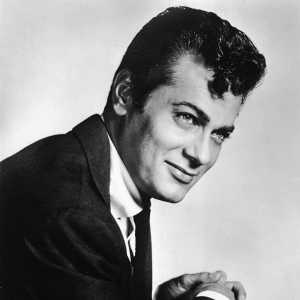Tony Curtis (born Bernard Schwartz; June 3, 1925 – September 29, 2010) was an American actor whose career spanned six decades, achieving the height of his popularity in the 1950s and early 1960s. He acted in more than 100 films, in roles covering a wide range of genres. In his later years, Curtis made numerous television appearances.
He achieved his first major recognition as a dramatic actor in Sweet Smell of Success (1957) with co-star Burt Lancaster. The following year he was nominated for the Academy Award for Best Actor for The Defiant Ones (1958) alongside Sidney Poitier (who was also nominated in the same category). This was followed by the comedies Some Like It Hot and Operation Petticoat in 1959. In 1960, Curtis played a supporting role in the epic historical drama Spartacus.
His stardom and film career declined considerably after 1960. His most significant dramatic part came in 1968 when he starred in the true-life drama The Boston Strangler. Curtis also took on the role of the Ukrainian Cossack Andrei in the historical action romance epic Taras Bulba in 1962 and starred in the ITC TV series The Persuaders!, with Curtis playing American millionaire Danny Wilde. The series ran for twenty-four episodes.
Curtis is the father of actresses Kelly Curtis and Jamie Lee Curtis with his first wife, actress Janet Leigh, and actresses Allegra Curtis and Alexandra Curtis with his second wife Christine Kaufmann.
Early life
Tony Curtis was born Bernard Schwartz on June 3, 1925, at the Fifth Avenue Hospital corner of East 105th Street in East Harlem, Manhattan the first of three boys born to Helen (née Klein) and Emanuel Schwartz.
His parents were Jewish emigrants from Hungary: his father was born in Ópályi, near Mátészalka, and his mother was a native of Nagymihály (now Michalovce, Slovakia); she later said she arrived in the U.S. from Válykó (now Vaľkovo, Slovakia). He spoke only Hungarian until the age of six, delaying his schooling. His father was a tailor and the family lived in the back of the shop. His mother was later diagnosed with schizophrenia. His youngest brother Robert was institutionalized with the same mental illness.
When Curtis was eight, he and his brother Julius were placed in an orphanage for a month because their parents could not afford to feed them. Four years later, Julius was struck and killed by a truck. Curtis joined a neighborhood gang whose main crimes were playing truant from school and minor pilfering at the local dime store. When Curtis was 11, a friendly neighbor saved him from what he felt would have led to a life of delinquency by sending him to a Boy Scout camp, where he was able to work off his energy and settle down. He attended Seward Park High School. At 16, he had his first small acting part in a school stage play.
